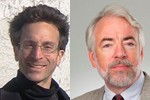Michael Ash, economics, and Max Page, art, co-authored an op-ed piece for the Daily Hampshire Gazette about budget cuts that call for a “shared sacrificed.” (Daily Hampshire Gazette, 4/20/10)
The myth of ‘shared sacrifice’
by Daily Hampshire Gazette
AMHERST – “Shared sacrifice.” You will hear the governor say it every time he talks about the budget. It is the phrase used by Charles Murphy, chair of the House Ways and Means Committee, when he unveiled a budget that cuts local aid – schools, police and fire, libraries, parks – by $234 million, and public higher education by $132 million.
It was echoed by Michael Widmer of the Massachusetts Taxpayers Association when he endorsed the House’s budget; “They (cities and towns) need to share in the pain given our fiscal realities.”
“Shared sacrifice” must poll well in focus groups. But it is a lie and a fraud.
There is nothing shared about the pain in the state budget being debated in the Senate. Ask anyone in a position of power this simple question: How are the most fortunate in our Commonwealth being asked to contribute to our common problem, namely an economic crisis and budget deficit?”
We’ll supply the answer: Nothing.
There is nothing in the governor’s budget nor in the House’s that demands any “shared sacrifice” from those most able to share.
Gov. Deval Patrick and Speaker Robert A. DeLeo can repeat this stock phrase all they want, but the reality is that the budget is balanced on the backs of working families, schoolchildren and college students, and the pain is shared only by those millions among us who lack political pull.
For a state that was at the forefront of the American Revolution, the Industrial Revolution and Civil Rights revolution, Massachusetts is falling quickly behind the times. People are waking up to the idea that a robust public sector delivers what we need and cannot buy any other way: clean air and water; education from pre-K through college; health insurance. People increasingly understand that we need fair and reliable taxes to pay for these public goods. Massachusetts and America both expanded h! ealth insurance, but only the federal version pays with progressive taxes.
Voters in Oregon voted overwhelmingly – by an 8 percent margin – to raise the corporate income tax and to assess an income-tax surcharge on the wealthiest citizens. In nearby New York, taxes on the wealthiest citizens are part of the solution to budget deficits.
Consider this: Simply by returning the tax on unearned income – dividends and interest – to 12 percent, where it stood until 1999, we can wipe away all of the local aid cuts passed by the House, all of the cuts to public higher education and all of the cuts to Mass Health, our state’s health insurance program for the poor. The tax on unearned income is paid almost exclusively by people making over $200,000 a year.
The governor and the Massachusetts Legislature have shown spectacular cowardice in the face of anti-tax zealots. Our so-called leaders whisper in hushed tones, “They’ll murder us at the polls if we vote for ta xes. Taxes are off the table.”
It is time for some anger an! d zealotry on our side – the side that believes that we build our common wealth by investing in our schools and universities, by protecting the most vulnerable, by keeping our water clean and our libraries open.
This budget season gives us a chance to show our children that our state has good values – that we value schools and teachers and health care for the poor over continued tax breaks for the rich. That is the choice before our governor and Legislature.
This year provides a critical test of whether any circumstances can push Massachusetts Democrats to stand up for working people and the middle class. If our representatives are prepared to continue the destruction of our Commonwealth rather than asking the Lexus-driving class to help out, then they should expect to share in the sacrifice – at the ballot box this November.
Max Page is a professor of architecture and history and Michael Ash is an associate professor of economics, both at the University of Massachusetts Amherst.







